Poetry & Limericks
-
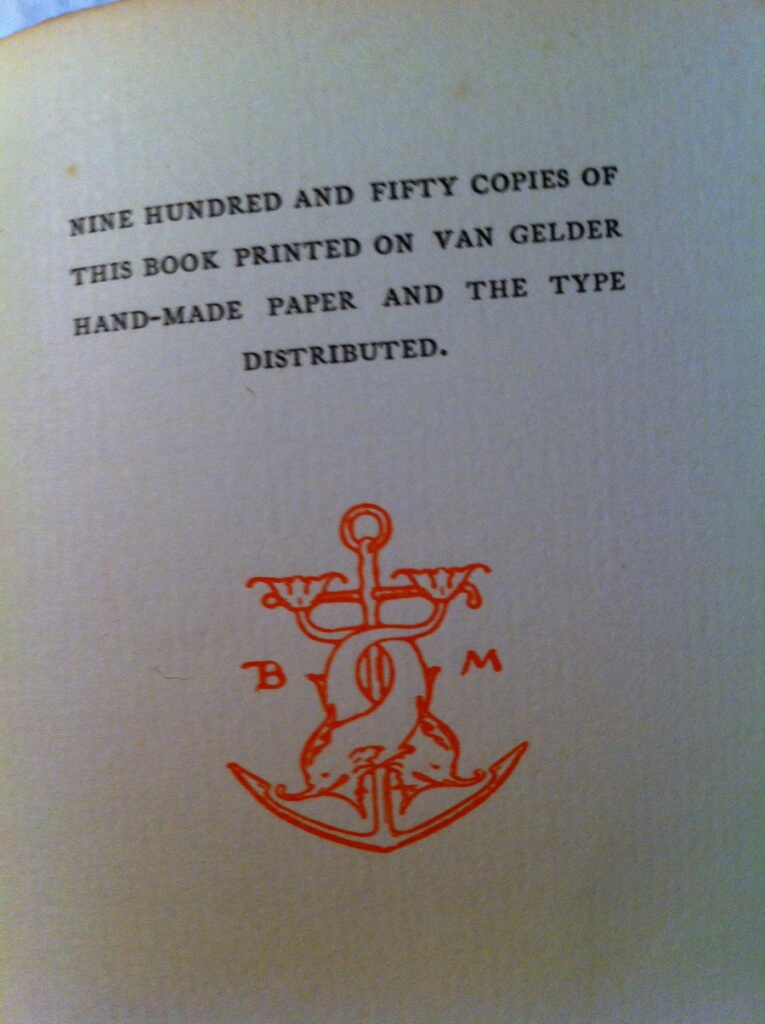
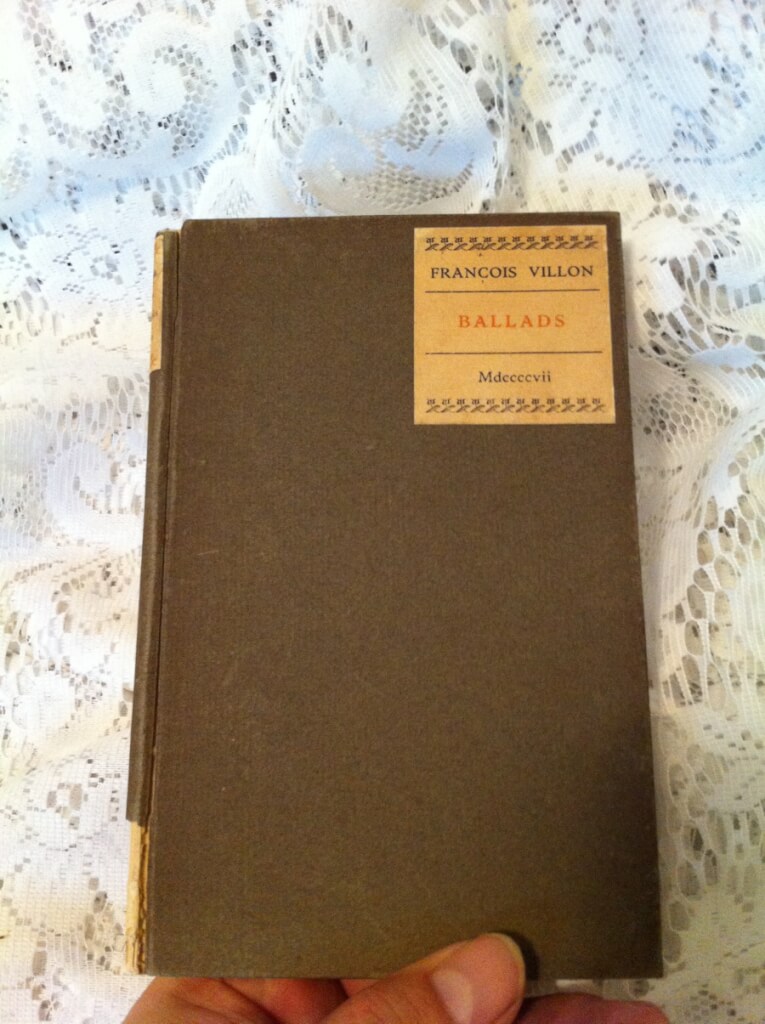 Ballands Done Into English from the French of Francois Villon, Francois Villon (Thomas B. Mosher, 1907) 7" X 4.5", 43pp, hardbound, grey boards with paper labels on cover and spine. Fair condition for age, spine loose on one side but holding, hinges good, fore and bottom edges deckled, owner's signatures on front pastedown François Villon (c. 1431_1464) was a French poet. Most of what is known about Villon has been gathered from legal records and gleaned from his own writings. He was a thief, killer, barroom brawler, and vagabond. He is perhaps best known for his Testaments and his Ballades. He was the most famous realist poet of the Middle Ages.
Ballands Done Into English from the French of Francois Villon, Francois Villon (Thomas B. Mosher, 1907) 7" X 4.5", 43pp, hardbound, grey boards with paper labels on cover and spine. Fair condition for age, spine loose on one side but holding, hinges good, fore and bottom edges deckled, owner's signatures on front pastedown François Villon (c. 1431_1464) was a French poet. Most of what is known about Villon has been gathered from legal records and gleaned from his own writings. He was a thief, killer, barroom brawler, and vagabond. He is perhaps best known for his Testaments and his Ballades. He was the most famous realist poet of the Middle Ages. -
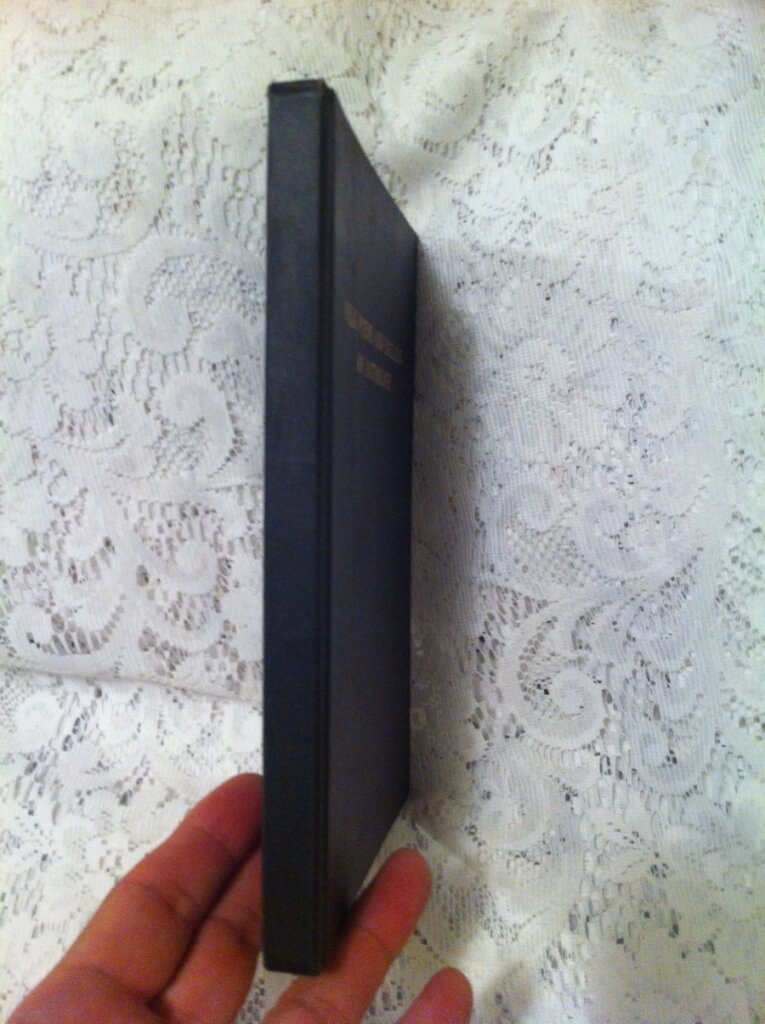
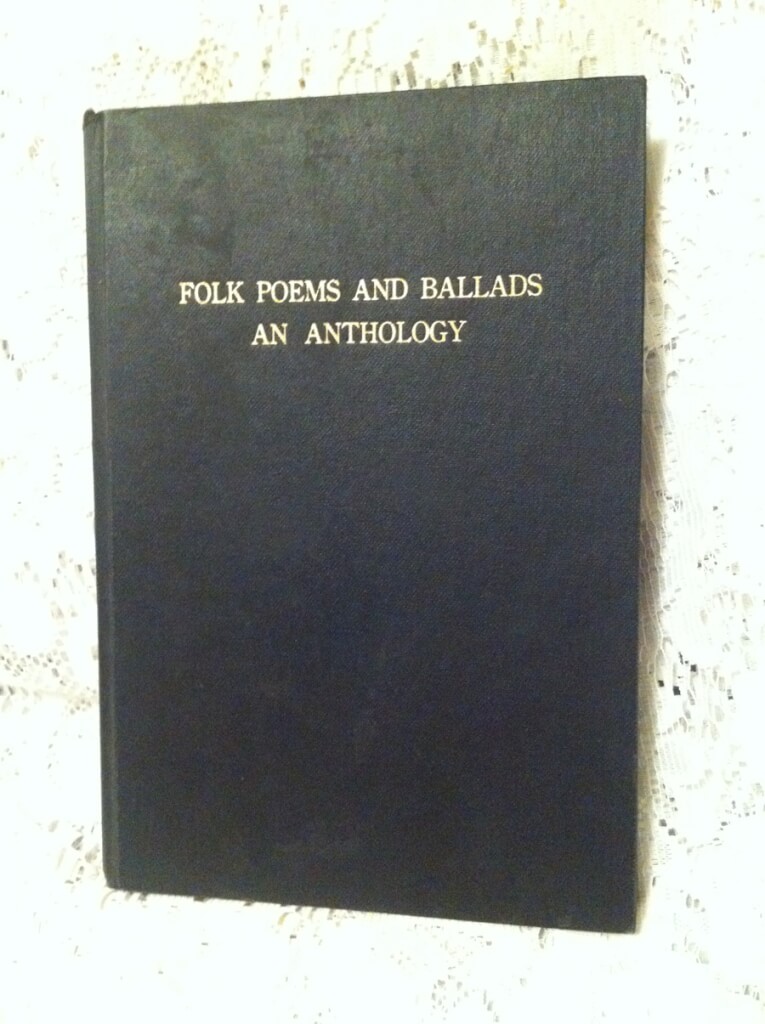 Folk Poems and Ballads An Anthology, anonymous [A. Reynolds Morse] ( Cruciform Press, Mexico City: Privately Printed for Private Circulation to Subscribers Only, 1944 [Cleveland, Ohio: A. Reynolds Morse, 1948.] #230/250) 8" X 5.5", vi 128pp. Hardbound, black cloth boards, gilt lettering on cover. Fair condition, 1st signature detached, 4th signature loose but holding (a common problem with these books), good copy of a poorly made book. Subtitled: "A collection of rare verses and amusing folk songs compiled from scarce and suppressed books as well as from verbal sources which modern prudery, false social customs, and intolerance laws have separated from the public and historical record." A. Reynolds Morse was an American, born in 1914, who died in 2000. He moved to Cleveland from Denver in 1941. An industrialist and philanthropist, he is best known for his activity in collecting works by Salvador Dali, and founding the Salvador Dali Museum. According to his obituary in the New York Times, Reynolds and his wife "embarked on a sometimes turbulent friendship with Dali and his wife, Gala". He also had a hobby of collecting and publishing works that other publishers would not print. Title page: "A collection of rare verses and amusing folk songs compiled from scarce and suppressed books as well as from verbal sources which modern prudery, false social customs, and intolerance have separated from the public and historical record." Mr. Morse also published "Limericks, A Facet of Our Culture". Both books were suppressed by police action in the late 1940's. This is the more rare of the two books.
Folk Poems and Ballads An Anthology, anonymous [A. Reynolds Morse] ( Cruciform Press, Mexico City: Privately Printed for Private Circulation to Subscribers Only, 1944 [Cleveland, Ohio: A. Reynolds Morse, 1948.] #230/250) 8" X 5.5", vi 128pp. Hardbound, black cloth boards, gilt lettering on cover. Fair condition, 1st signature detached, 4th signature loose but holding (a common problem with these books), good copy of a poorly made book. Subtitled: "A collection of rare verses and amusing folk songs compiled from scarce and suppressed books as well as from verbal sources which modern prudery, false social customs, and intolerance laws have separated from the public and historical record." A. Reynolds Morse was an American, born in 1914, who died in 2000. He moved to Cleveland from Denver in 1941. An industrialist and philanthropist, he is best known for his activity in collecting works by Salvador Dali, and founding the Salvador Dali Museum. According to his obituary in the New York Times, Reynolds and his wife "embarked on a sometimes turbulent friendship with Dali and his wife, Gala". He also had a hobby of collecting and publishing works that other publishers would not print. Title page: "A collection of rare verses and amusing folk songs compiled from scarce and suppressed books as well as from verbal sources which modern prudery, false social customs, and intolerance have separated from the public and historical record." Mr. Morse also published "Limericks, A Facet of Our Culture". Both books were suppressed by police action in the late 1940's. This is the more rare of the two books. -
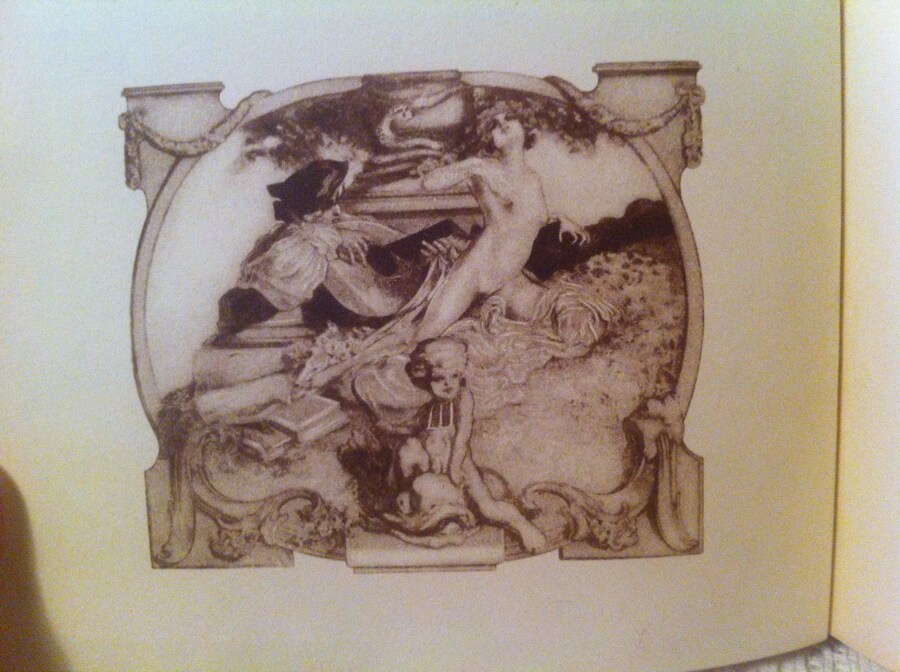
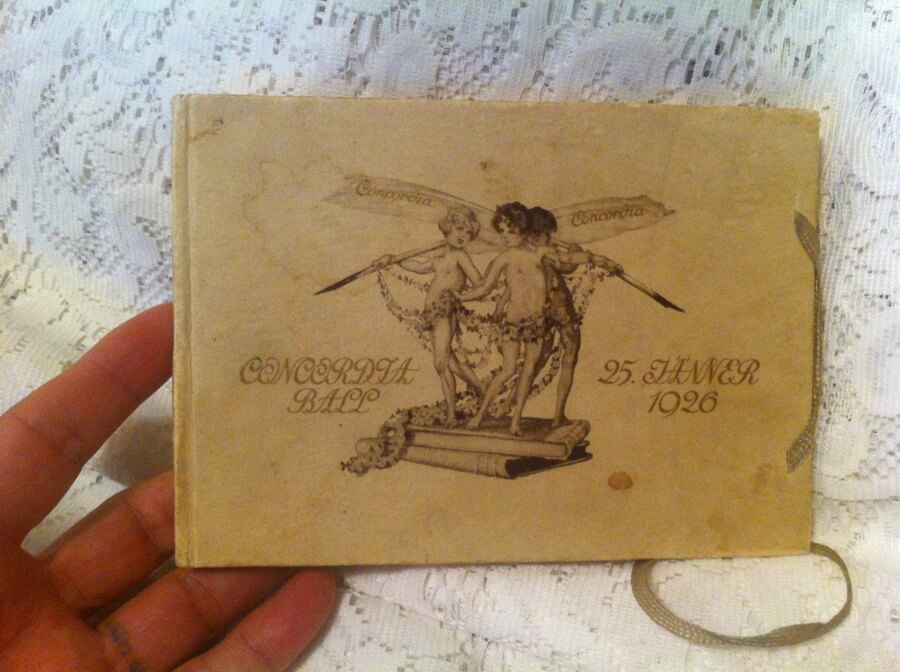 Galante Lieder und Gedichte, Concordia Ball 25. Jänner 1926 [Galante songs and poems with images after originals by Franz von Bayros selected by Johannes Pilz and Viktor Wögerer, Concordia Ball, January 25, 1926] (Der Presseclub Concordia, Strache, Vienna 1926) 6.5"x4.75", very good condition, boards slightly rubbed and stained, interior fine, with carrying strap intact. Press Club Concordia, an organization of Austrian journalists and writers, has been holding a traditional Viennese ball at the Vienna City Hall each June for over 150 years. In 1926 their program book featured art by Franz von Bayros. The illustrations feature both erotic and musical themes. This is a great piece of European/Austrian interbellum history, a rare find in this condition with the carrying strap still intact.
Galante Lieder und Gedichte, Concordia Ball 25. Jänner 1926 [Galante songs and poems with images after originals by Franz von Bayros selected by Johannes Pilz and Viktor Wögerer, Concordia Ball, January 25, 1926] (Der Presseclub Concordia, Strache, Vienna 1926) 6.5"x4.75", very good condition, boards slightly rubbed and stained, interior fine, with carrying strap intact. Press Club Concordia, an organization of Austrian journalists and writers, has been holding a traditional Viennese ball at the Vienna City Hall each June for over 150 years. In 1926 their program book featured art by Franz von Bayros. The illustrations feature both erotic and musical themes. This is a great piece of European/Austrian interbellum history, a rare find in this condition with the carrying strap still intact. -
Out of stock
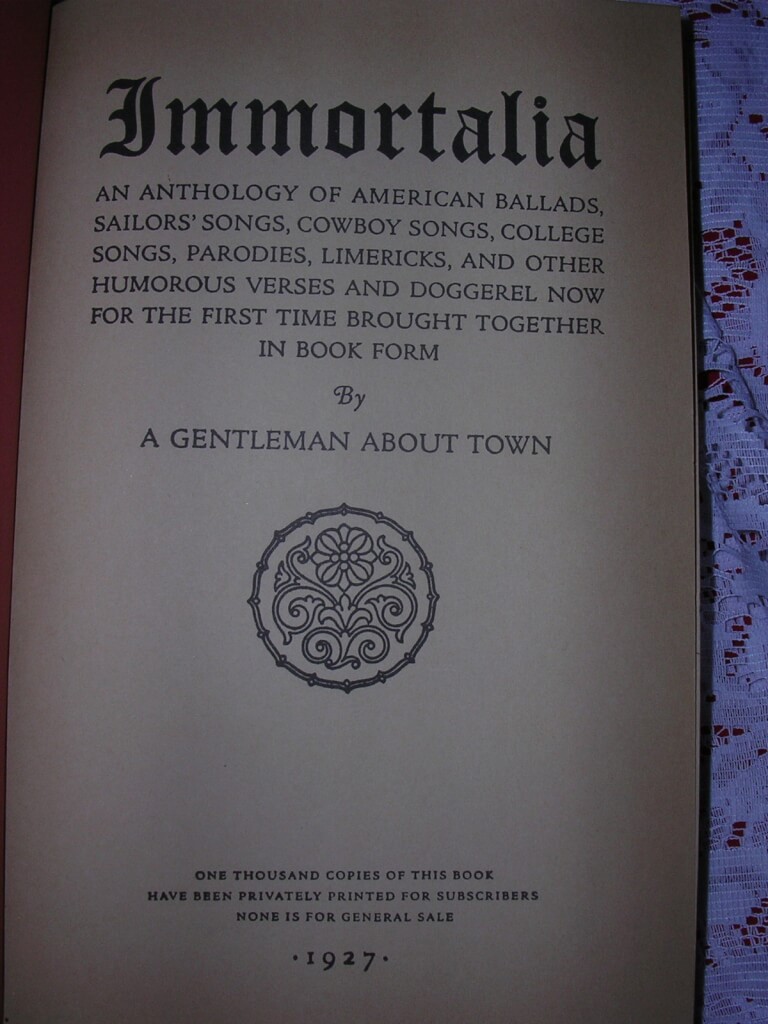
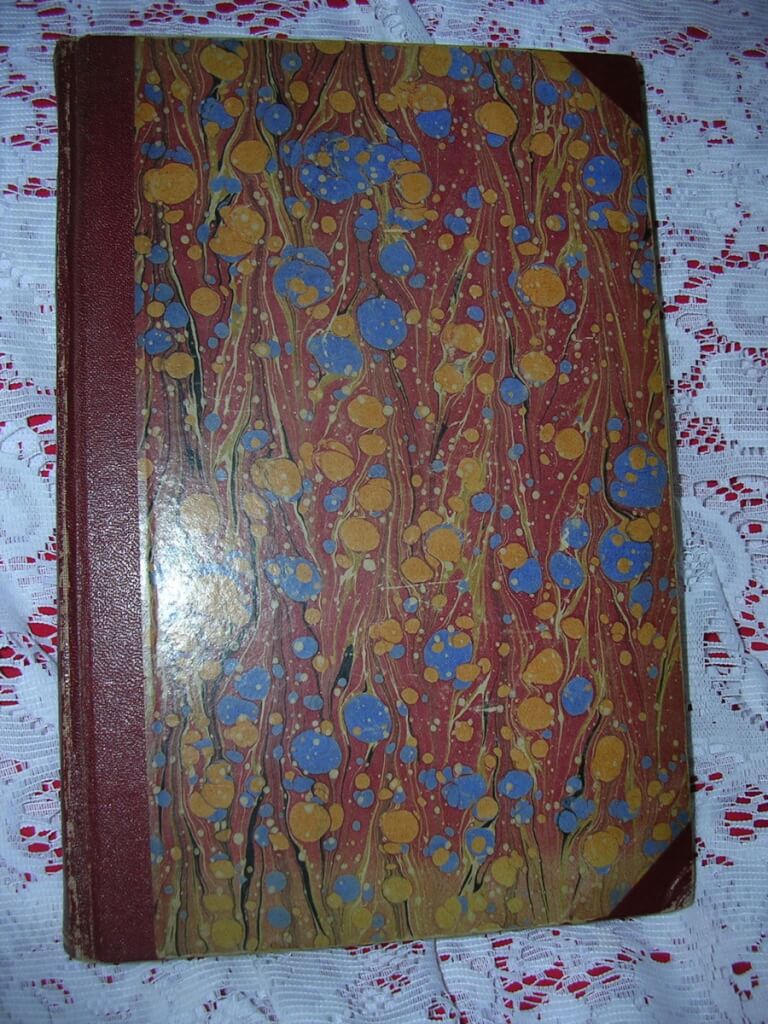 Immortalia, an anthology of american ballads, sailors' songs, cowboy songs, college songs, parodies, limericks, and other humorous verses and doggerel now for the first time brought together in book form, "By A Gentleman About Town" [T. R. Smith?] ("...privately printed for subscribers, none is for general sale" 1927 [pirated edition from the 2nd printing 1928 edtion, c.1932. New York: Samuel Roth or, less likely, Philadelphia: Nathan Young and Robert Sterling].) 6" x 8.75", iii, 184 pp., hardbound no DJ, decorated paper boards, cloth on spine and corners, worn edges on boards, corners bumped, binding tight. Assumed to be edited by T. R. Smith (George Macy, editor of Poetica Erotica around the same time). This is the most influential and widely published/circulated collection of "bawdry". Most collections since borrow from it liberally. There is a heavy emphasis on limericks (103 to be exact). Included are poems/"doggerel" attributed to James Joyce and D.H. Lawrence.
Immortalia, an anthology of american ballads, sailors' songs, cowboy songs, college songs, parodies, limericks, and other humorous verses and doggerel now for the first time brought together in book form, "By A Gentleman About Town" [T. R. Smith?] ("...privately printed for subscribers, none is for general sale" 1927 [pirated edition from the 2nd printing 1928 edtion, c.1932. New York: Samuel Roth or, less likely, Philadelphia: Nathan Young and Robert Sterling].) 6" x 8.75", iii, 184 pp., hardbound no DJ, decorated paper boards, cloth on spine and corners, worn edges on boards, corners bumped, binding tight. Assumed to be edited by T. R. Smith (George Macy, editor of Poetica Erotica around the same time). This is the most influential and widely published/circulated collection of "bawdry". Most collections since borrow from it liberally. There is a heavy emphasis on limericks (103 to be exact). Included are poems/"doggerel" attributed to James Joyce and D.H. Lawrence. -
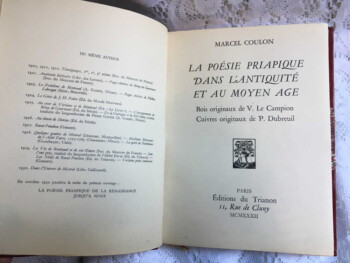
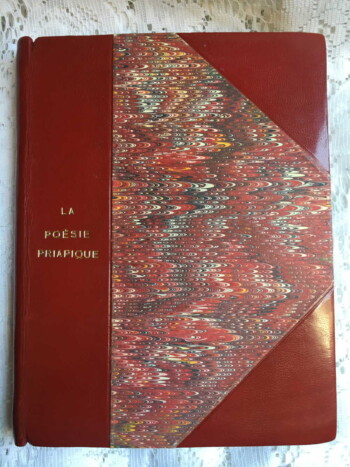 La poésie priapique dans l'antiquité et au moyen age [Priapic poetry in antiquity and the middle ages], ed. Marcel Coulon, 1 original wood engraving by V. Le Campion, 2 original brass engravings by P. Dubreuil (Éditions du Trianon, Paris, 1932, printed by Les Presses de Massoul, #119 of 750) 7.75"x6.25", 166pp+index, 3/4 bound red calf over marbled boards, gilt title on cover and spine, original french wraps bound in, marbled end papers, near fine condition, ribbon intact, pages clean. A history of priapic literature covering folklore, poetry, Priapus, mythology, homosexuality in the ancient world.
La poésie priapique dans l'antiquité et au moyen age [Priapic poetry in antiquity and the middle ages], ed. Marcel Coulon, 1 original wood engraving by V. Le Campion, 2 original brass engravings by P. Dubreuil (Éditions du Trianon, Paris, 1932, printed by Les Presses de Massoul, #119 of 750) 7.75"x6.25", 166pp+index, 3/4 bound red calf over marbled boards, gilt title on cover and spine, original french wraps bound in, marbled end papers, near fine condition, ribbon intact, pages clean. A history of priapic literature covering folklore, poetry, Priapus, mythology, homosexuality in the ancient world. -
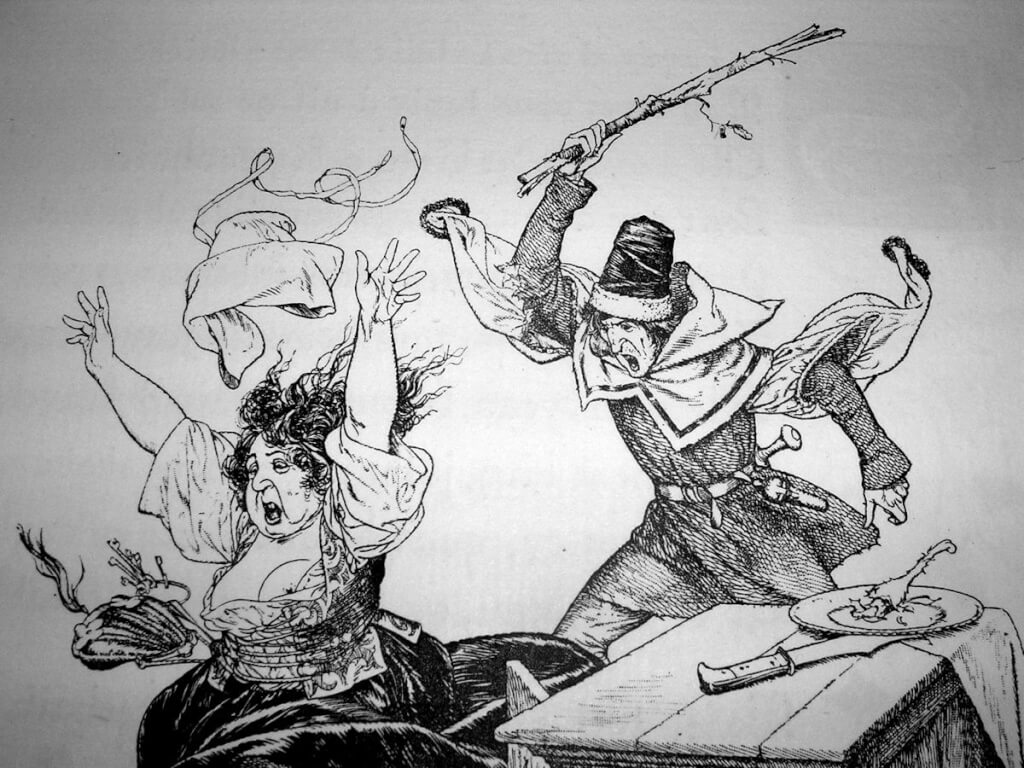
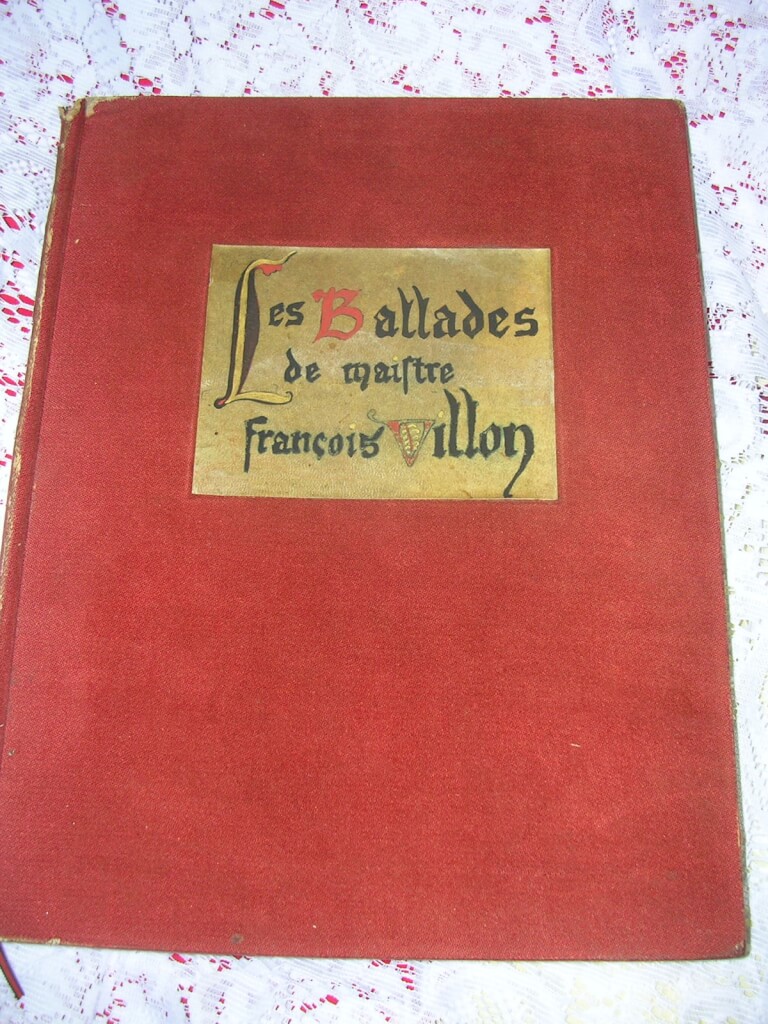 Les Ballades de Maistre Francois Villon, Francois Villon, illus. Chéri Hérouard, caligraphy ["escrites"] by Raymond de Rigné (chez Cres., Paris, 1919) 11.75" X 9.25", 169pp, rebound in red cloth boards with paper labels, decorated end papers. Original soft wraps intact. #450/550 signed by Hérouard. 31 full page drawings by Hérouard plus 31 small vignette type illustrations with a few "signed" by him. Beautifully printed on heavy deckle edged paper. good condition, wear to top and bottom of spine. ribbon intact. François Villon (c. 1431_1464) was a French poet. Most of what is known about Villon has been gathered from legal records and gleaned from his own writings. He was a thief, killer, barroom brawler, and vagabond. He is perhaps best known for his Testaments and his Ballades. He was the most famous realist poet of the Middle Ages. Chéri Hérouard (1881 - 1961) was a French illustrator who was most famously known for his forty-five-year work for French society magazine, La Vie Parisienne. Under the pseudonym of Herric, he also created erotic and sadomasochistic illustrations for various books including the Kama Sutra. This work was originally published with soft wraps. This copy has been beautifully rebound with it's original wraps intact.
Les Ballades de Maistre Francois Villon, Francois Villon, illus. Chéri Hérouard, caligraphy ["escrites"] by Raymond de Rigné (chez Cres., Paris, 1919) 11.75" X 9.25", 169pp, rebound in red cloth boards with paper labels, decorated end papers. Original soft wraps intact. #450/550 signed by Hérouard. 31 full page drawings by Hérouard plus 31 small vignette type illustrations with a few "signed" by him. Beautifully printed on heavy deckle edged paper. good condition, wear to top and bottom of spine. ribbon intact. François Villon (c. 1431_1464) was a French poet. Most of what is known about Villon has been gathered from legal records and gleaned from his own writings. He was a thief, killer, barroom brawler, and vagabond. He is perhaps best known for his Testaments and his Ballades. He was the most famous realist poet of the Middle Ages. Chéri Hérouard (1881 - 1961) was a French illustrator who was most famously known for his forty-five-year work for French society magazine, La Vie Parisienne. Under the pseudonym of Herric, he also created erotic and sadomasochistic illustrations for various books including the Kama Sutra. This work was originally published with soft wraps. This copy has been beautifully rebound with it's original wraps intact. -
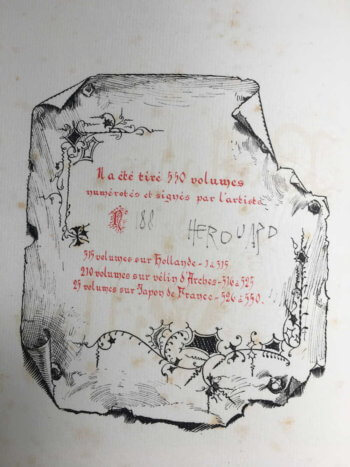
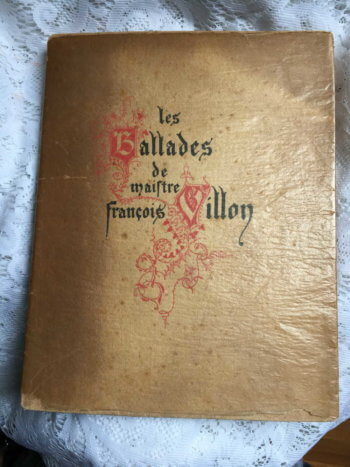 Les Ballades de Maistre Francois Villon, Francois Villon, illus. Chéri Hérouard, caligraphy ["escrites"] by Raymond de Rigné (chez Cres., Paris, 1919, #188/550 signed by Hérouard) 11.75" X 9.25", 169pp, original french wraps with glassine cover, 31 full page drawings by Hérouard plus 31 small vignette type illustrations. Beautifully printed on heavy deckle edged paper. good condition, all original, minor rubbing, slight foxing on outer pages, inner pages clean, rips in glassine cover at top and bottom of spine. François Villon (c. 1431_1464) was a French poet. Most of what is known about Villon has been gathered from legal records and gleaned from his own writings. He was a thief, killer, barroom brawler, and vagabond. He is perhaps best known for his Testaments and his Ballades. He was the most famous realist poet of the Middle Ages. Chéri Hérouard (1881 - 1961) was a French illustrator who was most famously known for his forty-five-year work for French society magazine, La Vie Parisienne. Under the pseudonym of Herric, he also created erotic and sadomasochistic illustrations for various books including the Kama Sutra.
Les Ballades de Maistre Francois Villon, Francois Villon, illus. Chéri Hérouard, caligraphy ["escrites"] by Raymond de Rigné (chez Cres., Paris, 1919, #188/550 signed by Hérouard) 11.75" X 9.25", 169pp, original french wraps with glassine cover, 31 full page drawings by Hérouard plus 31 small vignette type illustrations. Beautifully printed on heavy deckle edged paper. good condition, all original, minor rubbing, slight foxing on outer pages, inner pages clean, rips in glassine cover at top and bottom of spine. François Villon (c. 1431_1464) was a French poet. Most of what is known about Villon has been gathered from legal records and gleaned from his own writings. He was a thief, killer, barroom brawler, and vagabond. He is perhaps best known for his Testaments and his Ballades. He was the most famous realist poet of the Middle Ages. Chéri Hérouard (1881 - 1961) was a French illustrator who was most famously known for his forty-five-year work for French society magazine, La Vie Parisienne. Under the pseudonym of Herric, he also created erotic and sadomasochistic illustrations for various books including the Kama Sutra. -
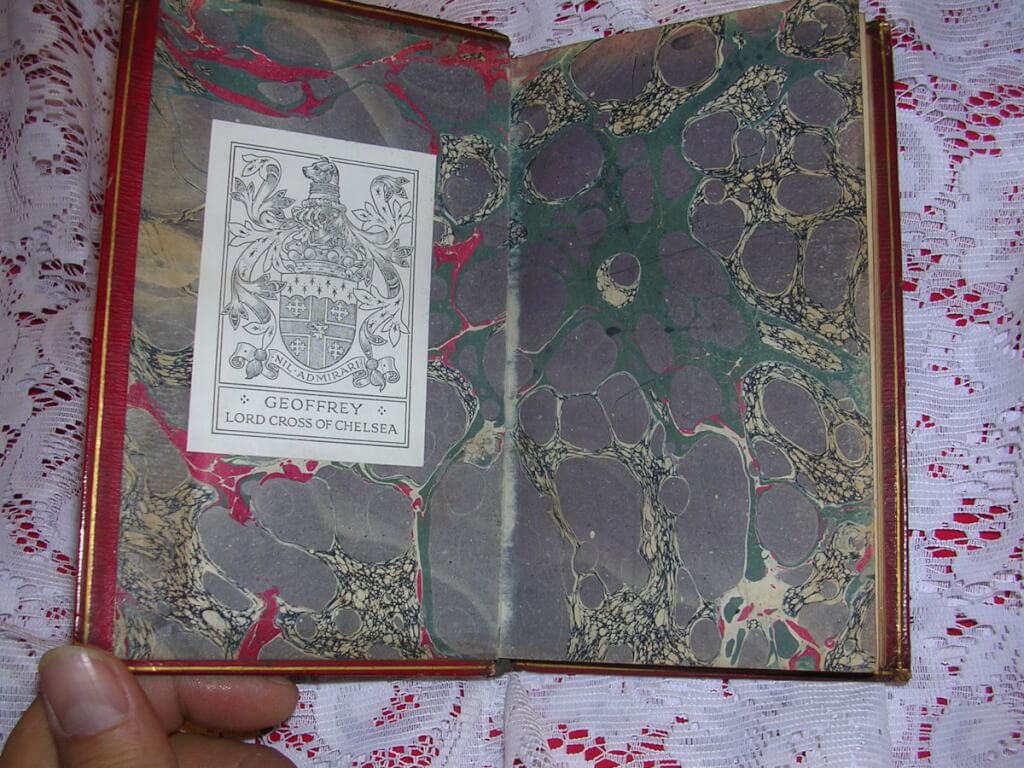
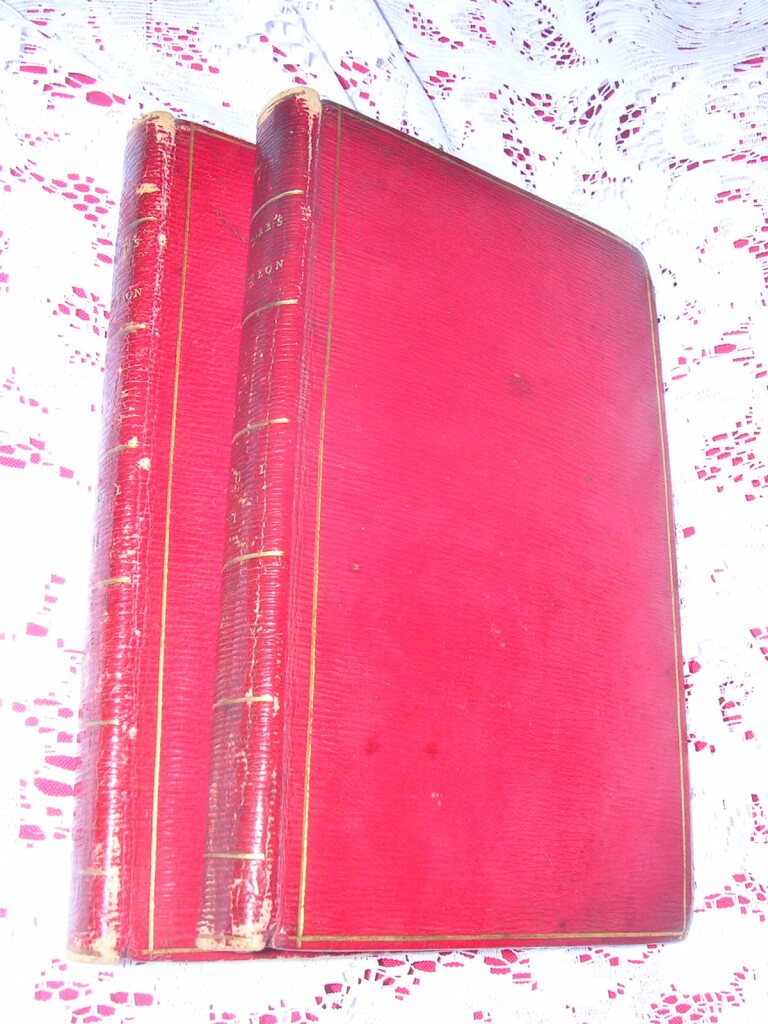 Odes of Anacreon, Anacreon, trans. Thomas Moore (J. and T. Carpenter, London, 1802) 6 1/2" X 4 1/4", 2 vol. 163pp 148pp, hardbound in red morocco with gilt lettering and decorations, gilted edges, marbled boards, worn edges and corners befitting it's age, binding tight, ribbon markers intact. Armorial bookplate of british judge, Geoffrey Lord Cross of Chelsea on front pastedowns Anacreon (582 BC _ 485 BC) was a Greek lyric poet, notable for his drinking songs and hymns. Later Greeks included him in the canonical list of nine lyric poets. Thomas Moore (1779 _ 1852) is considered Ireland's "National Bard". He was a poet, singer, songwriter, and entertainer. He was responsible, with John Murray, for burning Lord Byron's memoirs after his death. These books are the second edition (original edition published in 1800) of his first work, a translation that he did at Middle Temple where he studied law. In his lifetime he was often referred to as Anacreon Moore.
Odes of Anacreon, Anacreon, trans. Thomas Moore (J. and T. Carpenter, London, 1802) 6 1/2" X 4 1/4", 2 vol. 163pp 148pp, hardbound in red morocco with gilt lettering and decorations, gilted edges, marbled boards, worn edges and corners befitting it's age, binding tight, ribbon markers intact. Armorial bookplate of british judge, Geoffrey Lord Cross of Chelsea on front pastedowns Anacreon (582 BC _ 485 BC) was a Greek lyric poet, notable for his drinking songs and hymns. Later Greeks included him in the canonical list of nine lyric poets. Thomas Moore (1779 _ 1852) is considered Ireland's "National Bard". He was a poet, singer, songwriter, and entertainer. He was responsible, with John Murray, for burning Lord Byron's memoirs after his death. These books are the second edition (original edition published in 1800) of his first work, a translation that he did at Middle Temple where he studied law. In his lifetime he was often referred to as Anacreon Moore. -
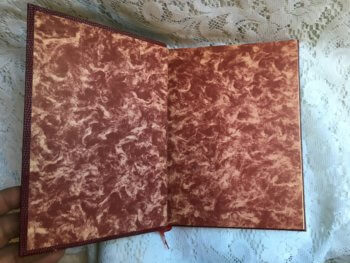
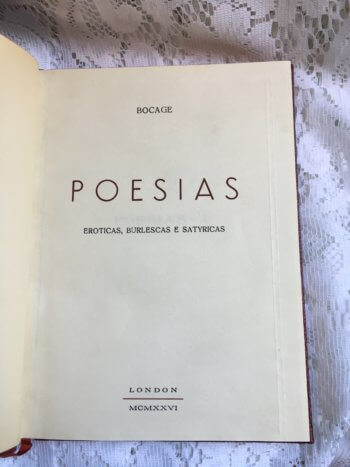 Poesias: eroticas, burlescas e satyricas, Bocage (Manuel Maria Barbosa du Bocage) (np, London, 1926, #443/1000 machine numbered) 6" X 8", 220pp, in Portuguese, hardcover, quarter bound red leather over red pebbled boards, gilt titles and decorations on spine, four raised bands, laid paper, top-edge inked, marbled end papers, ribbon present, a handsome quarter-leather bound copy of a clandestinely published edition of Bocage's unpublishable works. (most copies of this edition are softbound). Manuel Maria Barbosa du Bocage (1765-1805) was a Portuguese Neoclassic poet, writing at the beginning of his career under the pen name Elmano Sadino. He aspired to be a second Camões. He was born, the son of a lawyer, in Setúbal, Portugal. He is said to to have made verses in infancy, and being somewhat of a prodigy grew up to be flattered, self-conscious and unstable. He left home at age 14 to join the army then transfered to the navy at age 16. While in the military he devoted most of his energies to love affairs, poetry, and bohemianism. Eventually, like his hero Camões, he was sent to India and became disillusioned by the Orient. He deserted to Macau, returning to Lisbon in 1790. He then joined the New Arcadia, a literary society with vaguely egalitarian and libertarian sympathies, but his satires on his fellow members resulted in his expulsion. In 1797 he was accused of propagating republicanism and atheism and was imprisoned. During his imprisonment he undertook translations of Virgil and Ovid. Translations provided him with a livelihood during the few years that he lived after his release. Despite the Neoclassical framework of his poetry, his intensely personal accent, frequent violence of expression, and self-dramatizing obsession with fate and death anticipate Romanticism. The subversiveness of his poems has meant that for much of the last 200 years they have not been (officially) available in Portugal.
Poesias: eroticas, burlescas e satyricas, Bocage (Manuel Maria Barbosa du Bocage) (np, London, 1926, #443/1000 machine numbered) 6" X 8", 220pp, in Portuguese, hardcover, quarter bound red leather over red pebbled boards, gilt titles and decorations on spine, four raised bands, laid paper, top-edge inked, marbled end papers, ribbon present, a handsome quarter-leather bound copy of a clandestinely published edition of Bocage's unpublishable works. (most copies of this edition are softbound). Manuel Maria Barbosa du Bocage (1765-1805) was a Portuguese Neoclassic poet, writing at the beginning of his career under the pen name Elmano Sadino. He aspired to be a second Camões. He was born, the son of a lawyer, in Setúbal, Portugal. He is said to to have made verses in infancy, and being somewhat of a prodigy grew up to be flattered, self-conscious and unstable. He left home at age 14 to join the army then transfered to the navy at age 16. While in the military he devoted most of his energies to love affairs, poetry, and bohemianism. Eventually, like his hero Camões, he was sent to India and became disillusioned by the Orient. He deserted to Macau, returning to Lisbon in 1790. He then joined the New Arcadia, a literary society with vaguely egalitarian and libertarian sympathies, but his satires on his fellow members resulted in his expulsion. In 1797 he was accused of propagating republicanism and atheism and was imprisoned. During his imprisonment he undertook translations of Virgil and Ovid. Translations provided him with a livelihood during the few years that he lived after his release. Despite the Neoclassical framework of his poetry, his intensely personal accent, frequent violence of expression, and self-dramatizing obsession with fate and death anticipate Romanticism. The subversiveness of his poems has meant that for much of the last 200 years they have not been (officially) available in Portugal. -
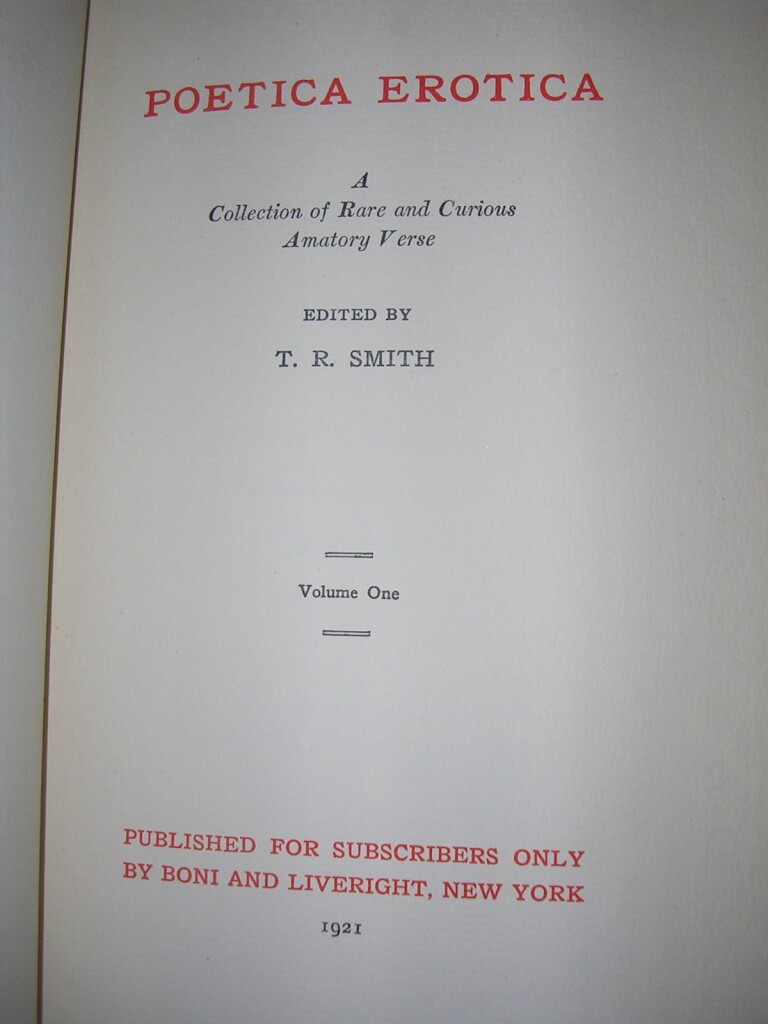
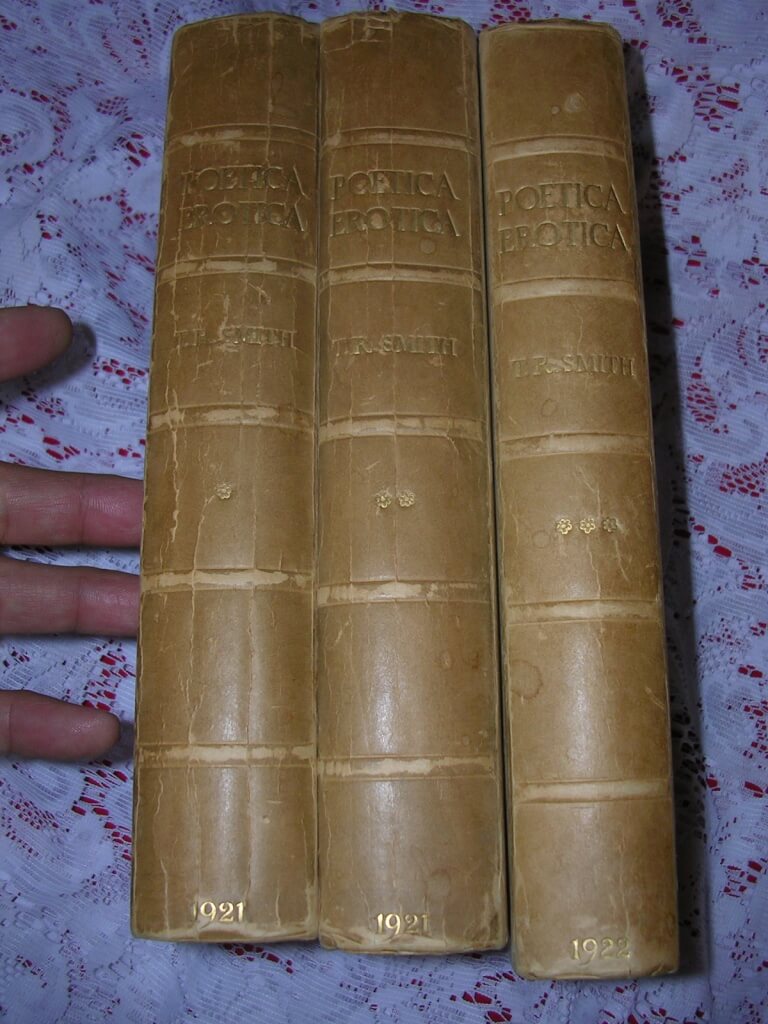 Poetica Erotica, T.R. Smith (editor) (Boni and Liveright, New York, 1921 (Vol. 3, 1922) [limited first edition, #523/1500]) 9 1/4" X 6 1/4", 3 vol. xxviii + 324, xvi + 328, xiv + 280, hardbound with green boards with cream vellum spines, deckle edges, corners bumped and worn, binding is tight, vol. 2 boards slightly loose. T. R. Smith writes "In these volumes Eros rules and Aphrodite guides the passionate motives....The poems contained in these volumes range from the earliest time to the present and the names of the most distinguished poets of yesterday and today will be found in the contents."
Poetica Erotica, T.R. Smith (editor) (Boni and Liveright, New York, 1921 (Vol. 3, 1922) [limited first edition, #523/1500]) 9 1/4" X 6 1/4", 3 vol. xxviii + 324, xvi + 328, xiv + 280, hardbound with green boards with cream vellum spines, deckle edges, corners bumped and worn, binding is tight, vol. 2 boards slightly loose. T. R. Smith writes "In these volumes Eros rules and Aphrodite guides the passionate motives....The poems contained in these volumes range from the earliest time to the present and the names of the most distinguished poets of yesterday and today will be found in the contents." -
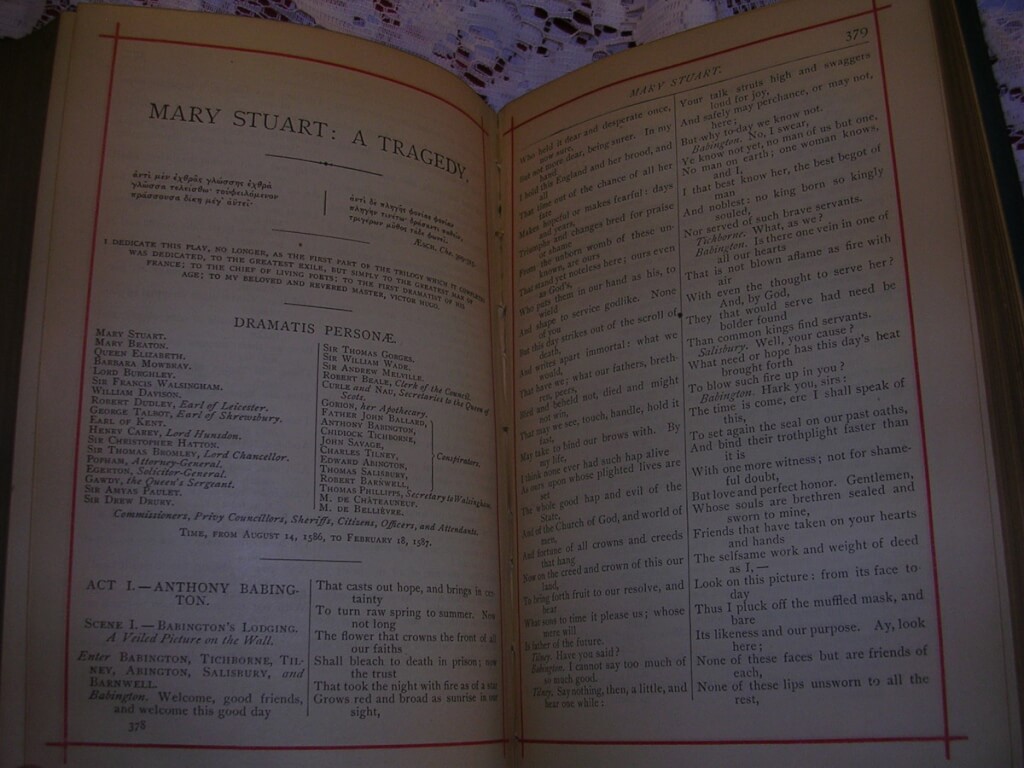
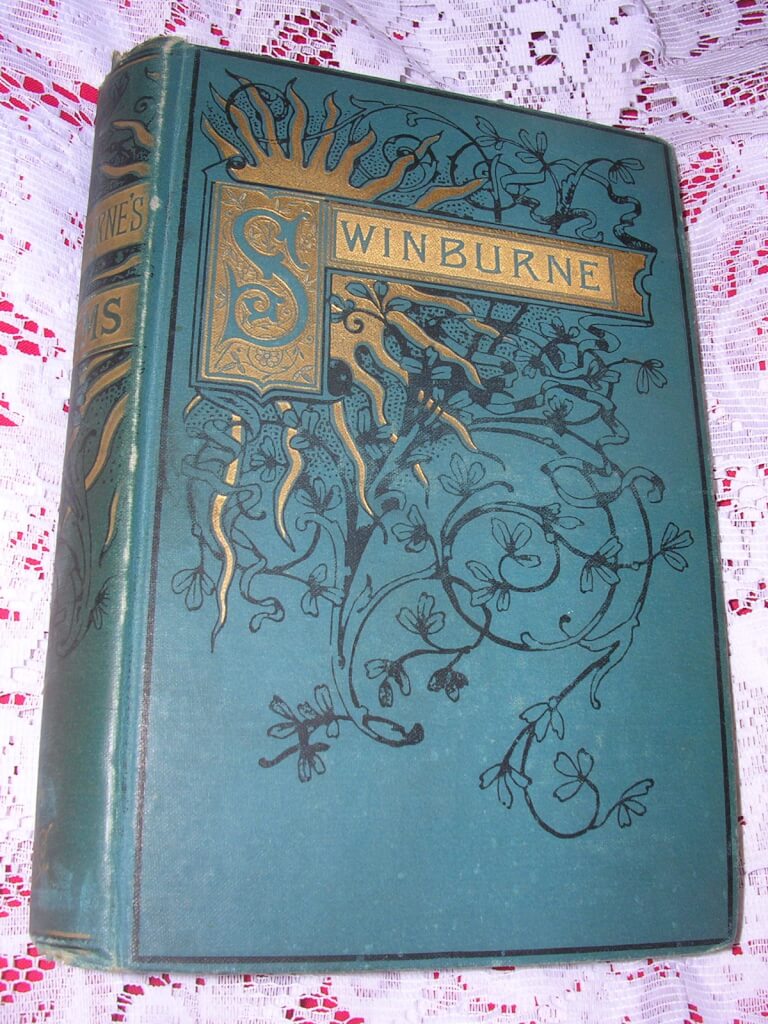 Selections from the Poetical Works of A. C. Swinburne, from the latest English edition of his works., A. C. Swinburne, ed. R. H. Stoddard (Thomas Y. Crowell & Co., New York, 1884 [first edition, thus.]) 7.5" x 5", xxii, 634pp, Hardcover, raised and gilted blue cloth decorated binding. Gilt edges internal pages framed in red lines. Good condition, bumped and worn corners and spine. Binding tight. Signed by previous owner "Ray E. Searls 1900" Swinburne was an English poet, playwright, novelist, and critic. Considered a decadent poet, although Swinburne perhaps professed to more vice than he actually indulged in; Oscar Wilde stated that Swinburne was "a braggart in matters of vice, who had done everything he could to convince his fellow citizens of his homosexuality and bestiality without being in the slightest degree a homosexual or a bestializer." He was nominated for the Nobel Prize in Literature in every year from 1903 to 1907 and again in 1909.
Selections from the Poetical Works of A. C. Swinburne, from the latest English edition of his works., A. C. Swinburne, ed. R. H. Stoddard (Thomas Y. Crowell & Co., New York, 1884 [first edition, thus.]) 7.5" x 5", xxii, 634pp, Hardcover, raised and gilted blue cloth decorated binding. Gilt edges internal pages framed in red lines. Good condition, bumped and worn corners and spine. Binding tight. Signed by previous owner "Ray E. Searls 1900" Swinburne was an English poet, playwright, novelist, and critic. Considered a decadent poet, although Swinburne perhaps professed to more vice than he actually indulged in; Oscar Wilde stated that Swinburne was "a braggart in matters of vice, who had done everything he could to convince his fellow citizens of his homosexuality and bestiality without being in the slightest degree a homosexual or a bestializer." He was nominated for the Nobel Prize in Literature in every year from 1903 to 1907 and again in 1909. -
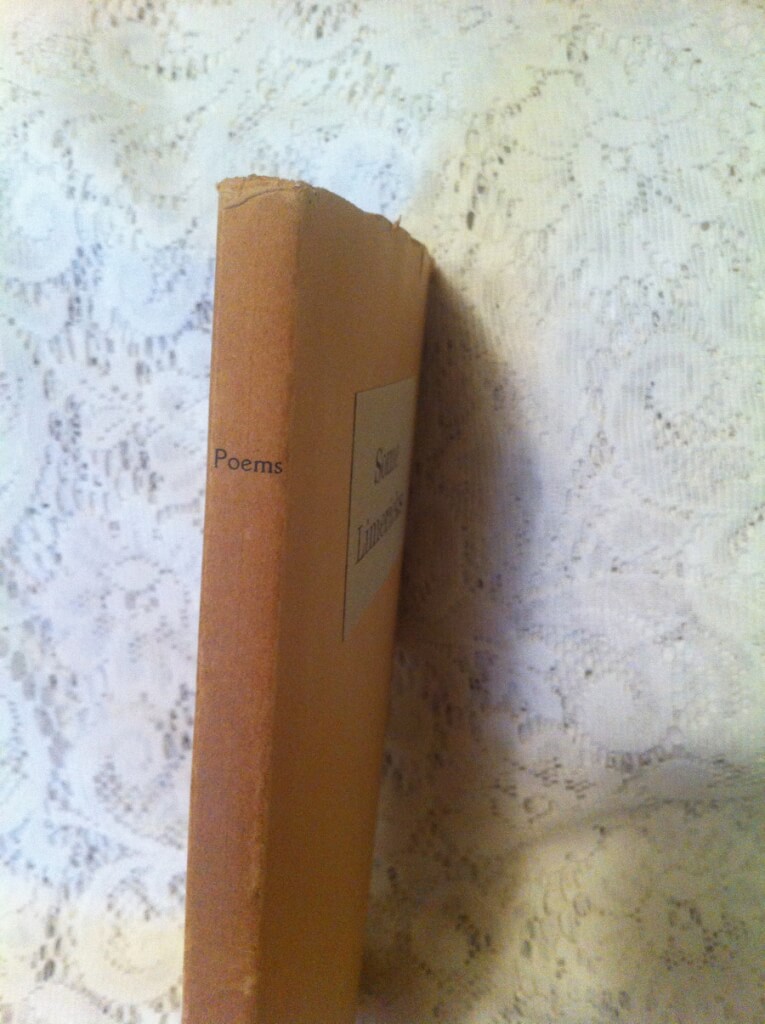
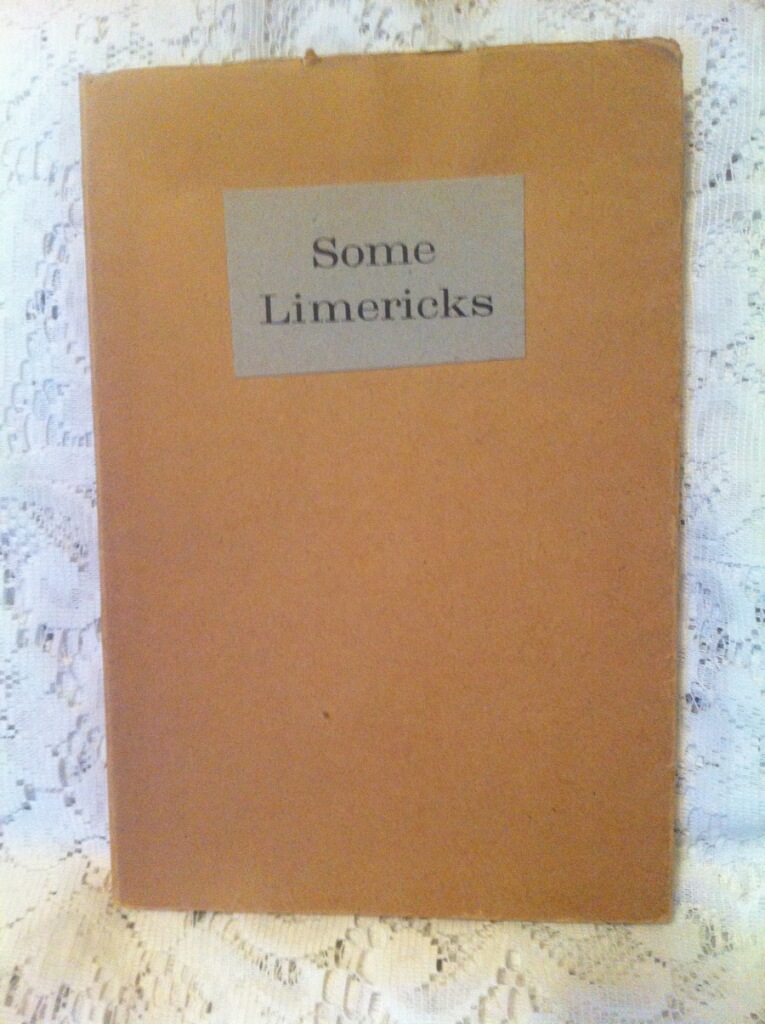 Some Limericks: Collected for the use of Students, & ensplendour’d with Introduction, Geographical Index, and with Notes Explanatory and Critical, by Norman Douglas (Nicholson and Whitney, Boston, 1942 [most likely published in Paris by Maurice Girodias of Olympia Press, early 1950's, a reprint of the Obelisk Press edition of 1939], stated 616/1000 "printed by The Brownbent Press, Boston, Mass.") 5.5" x 8.25", 117pp, near fine condition, unlabeled soft covers, dust jacket slightly warn at top with paper label "Some Limericks", spine of dust jacket simply reads "poems". Norman Douglas is an English author best known for his 1917 novel, South Wind. However, this particular book of his is one of the most pirated books of it's kind. Unable to find a publisher willing to take it on, Douglas published it himself in 1928. It was published by Oblisk Press in 1939 (said to be the last book secured for the company before Jack Kahane's lifetime). This particular edition was published by Mr. Kahane's son, Maurice Girodias, who inherited his father's press, but changed the name to Olympia Press. It is said that this book has everything, blasphemy, incest, paedophilia, bestiality. Accompanying each limericks are entertaining (if not scholarly) notes explaining the supposed origin and/or circumstances by which the rhymes were procured. So obscene and offensive, even Olympia Press, known for it's erotic literature, chose to publish under a false imprint.
Some Limericks: Collected for the use of Students, & ensplendour’d with Introduction, Geographical Index, and with Notes Explanatory and Critical, by Norman Douglas (Nicholson and Whitney, Boston, 1942 [most likely published in Paris by Maurice Girodias of Olympia Press, early 1950's, a reprint of the Obelisk Press edition of 1939], stated 616/1000 "printed by The Brownbent Press, Boston, Mass.") 5.5" x 8.25", 117pp, near fine condition, unlabeled soft covers, dust jacket slightly warn at top with paper label "Some Limericks", spine of dust jacket simply reads "poems". Norman Douglas is an English author best known for his 1917 novel, South Wind. However, this particular book of his is one of the most pirated books of it's kind. Unable to find a publisher willing to take it on, Douglas published it himself in 1928. It was published by Oblisk Press in 1939 (said to be the last book secured for the company before Jack Kahane's lifetime). This particular edition was published by Mr. Kahane's son, Maurice Girodias, who inherited his father's press, but changed the name to Olympia Press. It is said that this book has everything, blasphemy, incest, paedophilia, bestiality. Accompanying each limericks are entertaining (if not scholarly) notes explaining the supposed origin and/or circumstances by which the rhymes were procured. So obscene and offensive, even Olympia Press, known for it's erotic literature, chose to publish under a false imprint. -
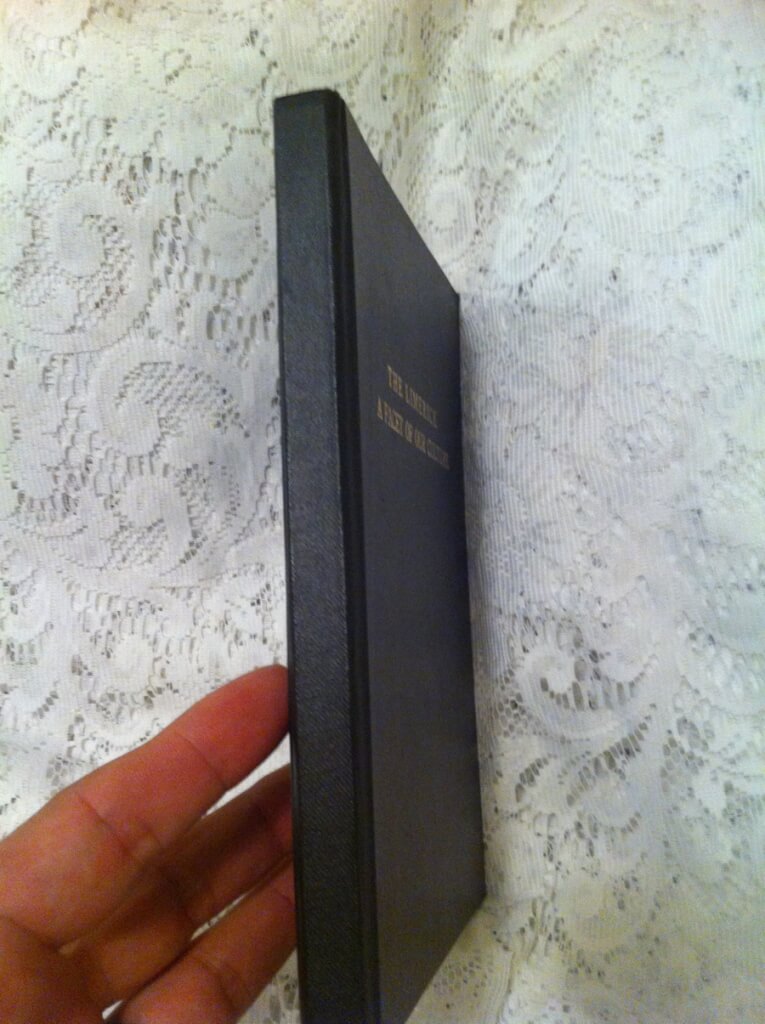
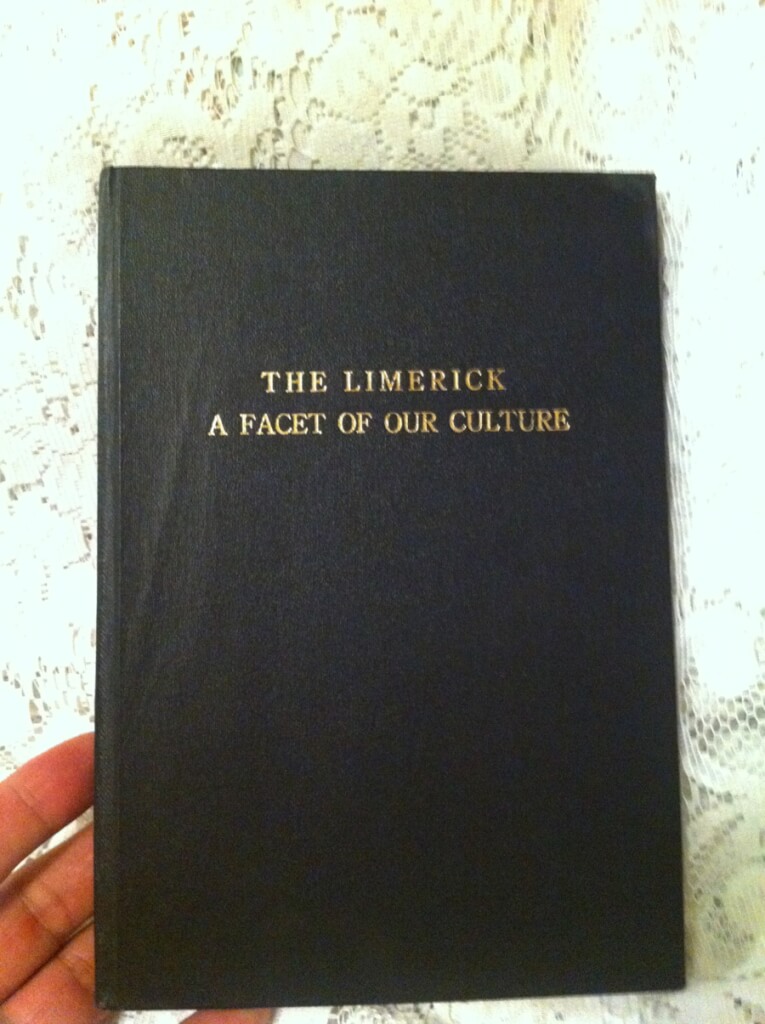 The Limerick, a facet of our culture, anonymous [A. Reynolds Morse] ( Cruciform Press, Mexico City: Privately Printed for Private Circulation to Subscribers Only, 1944 [Cleveland, Ohio: A. Reynolds Morse, 1948.] #208/250) 8" X 5.5", vii+157pp. Hardbound, black cloth boards, gilt lettering on cover. near fine condition (rare for this edition!), slight rust around staples. A. Reynolds Morse was an American, born in 1914, who died in 2000. He moved to Cleveland from Denver in 1941. An industrialist and philanthropist, he is best known for his activity in collecting works by Salvador Dali, and founding the Salvador Dali Museum. According to his obituary in the New York Times, Reynolds and his wife "embarked on a sometimes turbulent friendship with Dali and his wife, Gala". He also had a hobby of collecting and publishing works that other publishers would not print. Title page: "A study of the history and development of the limerick, ensplendor'd with over two hundred examples of the immortal verse form, commentaries, and index" This book is considered by most to be the "dirtiest" collection of limericks. Mr. Morse also published "Folk Poems and Ballads An Anthology". Both books were suppressed by police action in the late 1940's. This is a VERY rare near fine copy of this hard-to-find book. It was poorly made so most of the copies out there have signatures loose.
The Limerick, a facet of our culture, anonymous [A. Reynolds Morse] ( Cruciform Press, Mexico City: Privately Printed for Private Circulation to Subscribers Only, 1944 [Cleveland, Ohio: A. Reynolds Morse, 1948.] #208/250) 8" X 5.5", vii+157pp. Hardbound, black cloth boards, gilt lettering on cover. near fine condition (rare for this edition!), slight rust around staples. A. Reynolds Morse was an American, born in 1914, who died in 2000. He moved to Cleveland from Denver in 1941. An industrialist and philanthropist, he is best known for his activity in collecting works by Salvador Dali, and founding the Salvador Dali Museum. According to his obituary in the New York Times, Reynolds and his wife "embarked on a sometimes turbulent friendship with Dali and his wife, Gala". He also had a hobby of collecting and publishing works that other publishers would not print. Title page: "A study of the history and development of the limerick, ensplendor'd with over two hundred examples of the immortal verse form, commentaries, and index" This book is considered by most to be the "dirtiest" collection of limericks. Mr. Morse also published "Folk Poems and Ballads An Anthology". Both books were suppressed by police action in the late 1940's. This is a VERY rare near fine copy of this hard-to-find book. It was poorly made so most of the copies out there have signatures loose. -
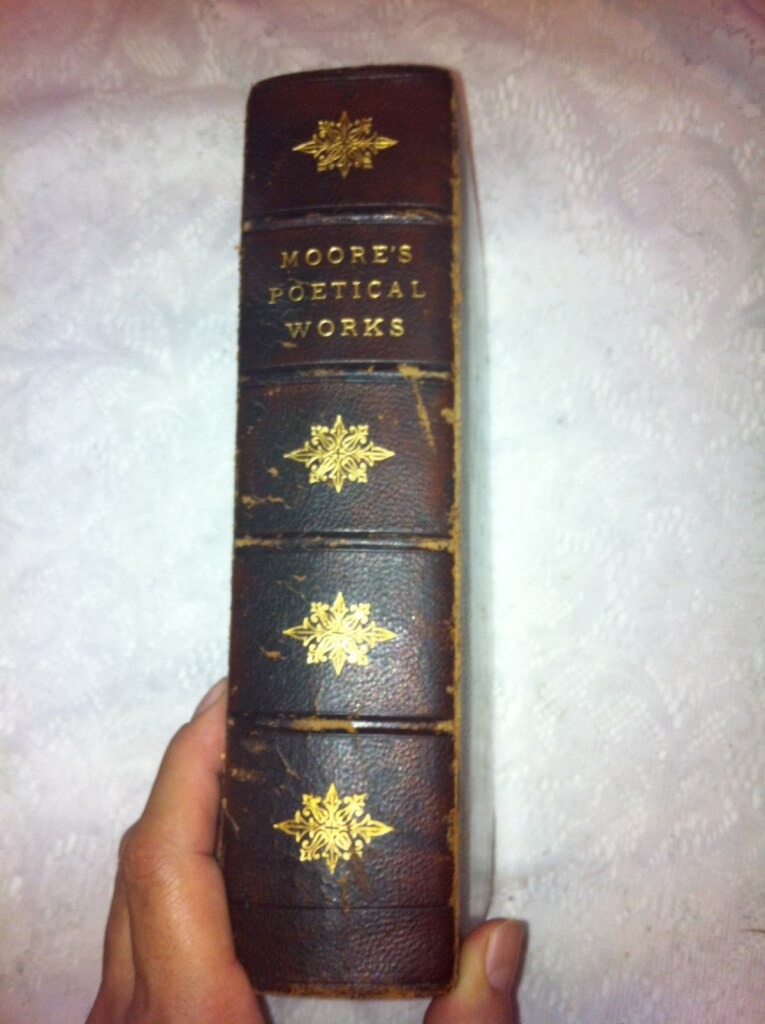
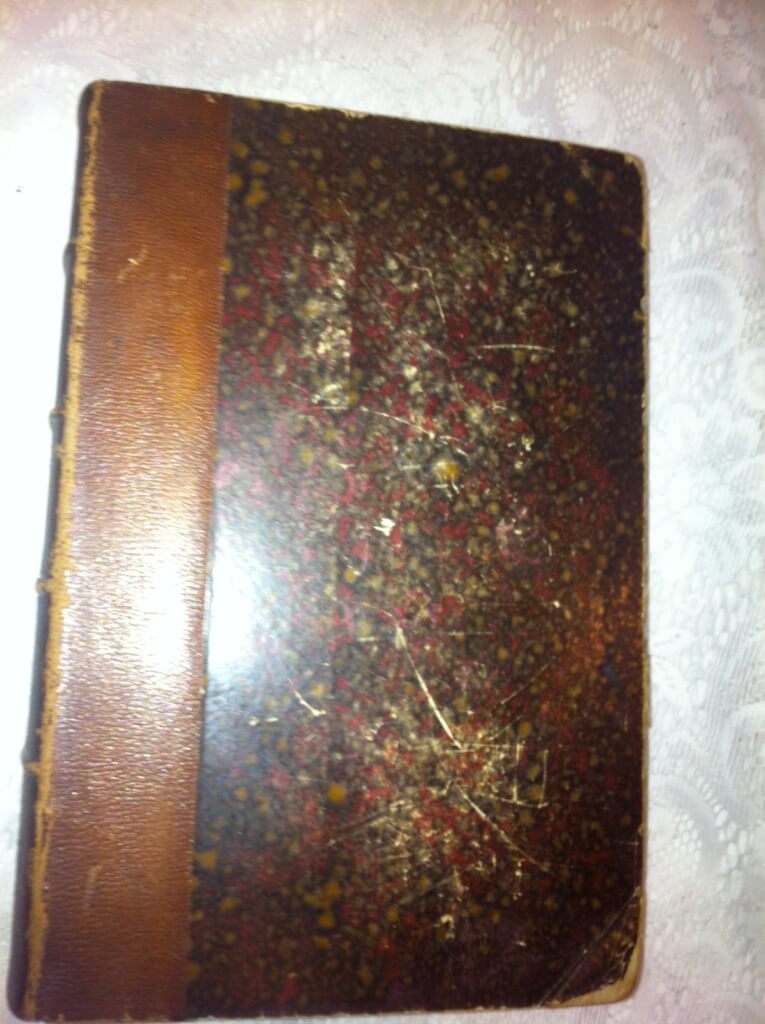 The Poetical Works of Thomas Moore, Thomas Moore (Oliver S. Felt, New York, nd. [c.1860]) 9.5" X 6.5", 776pp., half leather, 4 raised bands. 8 volumes in one. Beautiful steel engravings throughout. Fair condition, binding good, frontispiece missing. Thomas Moore (1779 - 1852) is considered Ireland's "National Bard". He was a poet, singer, songwriter, and entertainer. He was responsible, with John Murray, for burning Lord Byron's memoirs after his death.
The Poetical Works of Thomas Moore, Thomas Moore (Oliver S. Felt, New York, nd. [c.1860]) 9.5" X 6.5", 776pp., half leather, 4 raised bands. 8 volumes in one. Beautiful steel engravings throughout. Fair condition, binding good, frontispiece missing. Thomas Moore (1779 - 1852) is considered Ireland's "National Bard". He was a poet, singer, songwriter, and entertainer. He was responsible, with John Murray, for burning Lord Byron's memoirs after his death. -
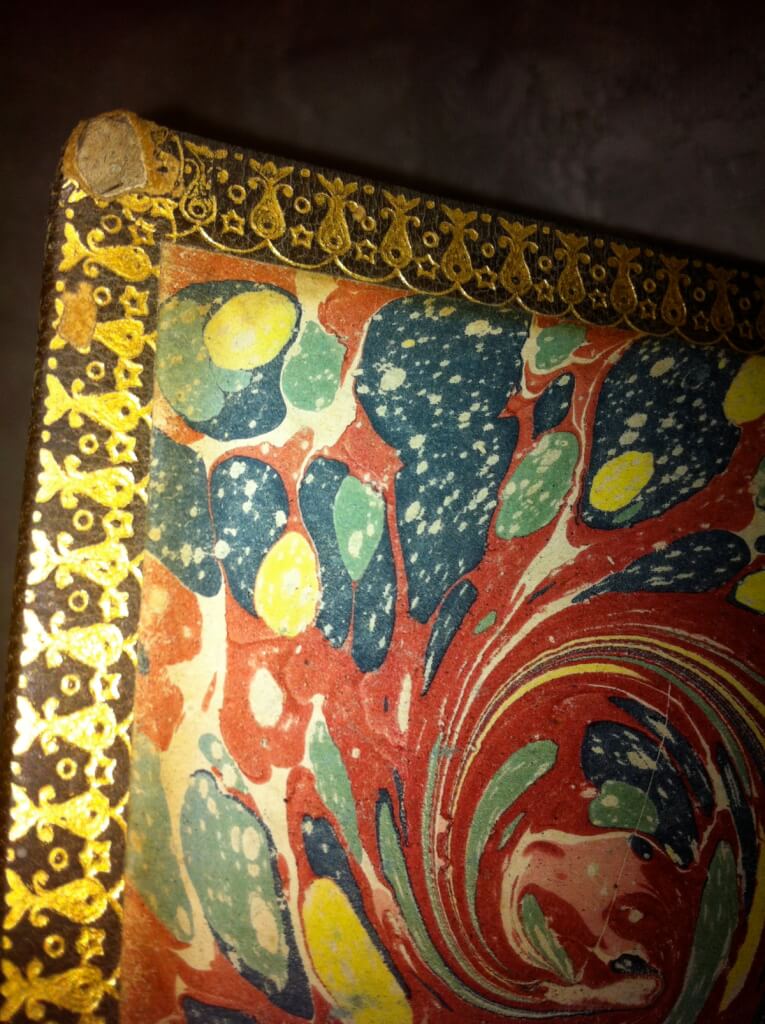
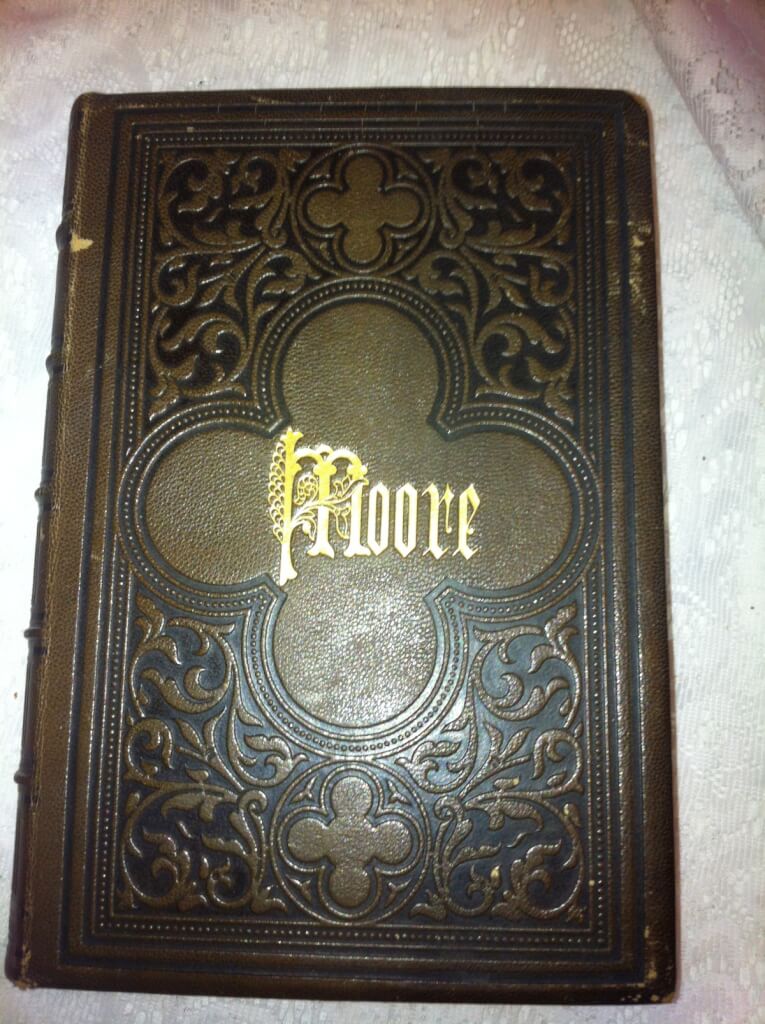 The Poetical Works of Thomas Moore, Thomas Moore (Oliver S. Felt, New York, nd. [c.1860]) 9.5" X 6.5", 776pp., 8 volumes in one. Full leather binding, tooled leather, gilt lettering and decorations, 5 raised bands on spine, marbled end papers, gilt edges. Beautiful steel engravings throughout with tissue guards. Thomas Moore (1779 _ 1852) is considered Ireland's "National Bard". He was a poet, singer, songwriter, and entertainer. He was responsible, with John Murray, for burning Lord Byron's memoirs after his death.
The Poetical Works of Thomas Moore, Thomas Moore (Oliver S. Felt, New York, nd. [c.1860]) 9.5" X 6.5", 776pp., 8 volumes in one. Full leather binding, tooled leather, gilt lettering and decorations, 5 raised bands on spine, marbled end papers, gilt edges. Beautiful steel engravings throughout with tissue guards. Thomas Moore (1779 _ 1852) is considered Ireland's "National Bard". He was a poet, singer, songwriter, and entertainer. He was responsible, with John Murray, for burning Lord Byron's memoirs after his death. -
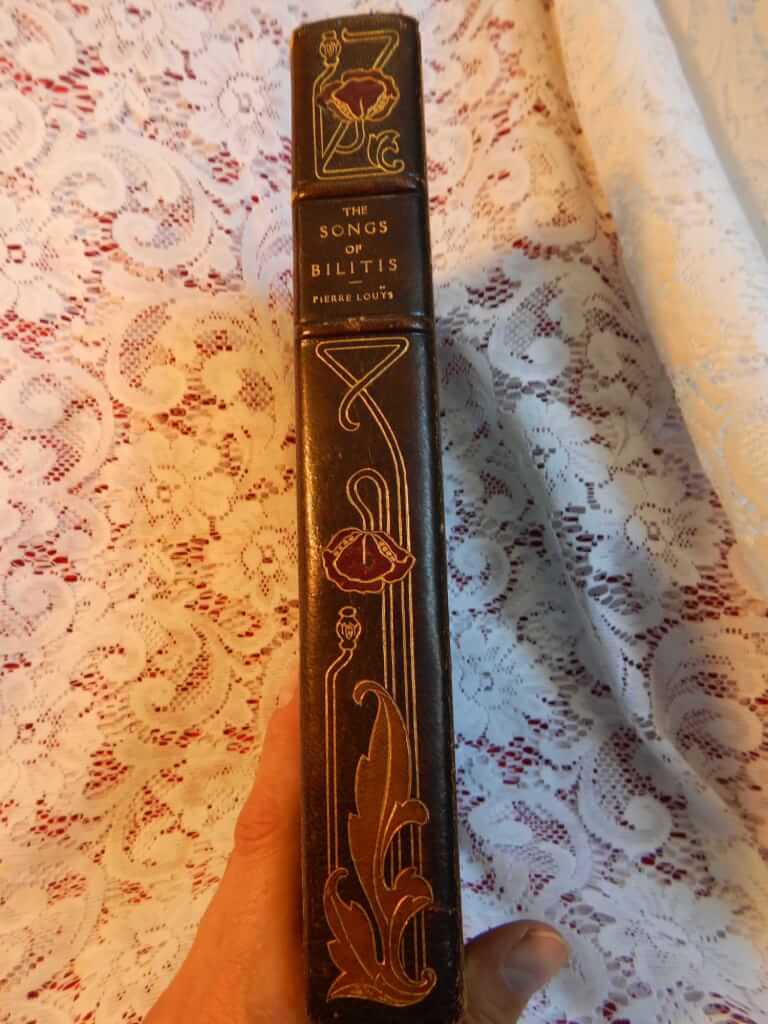
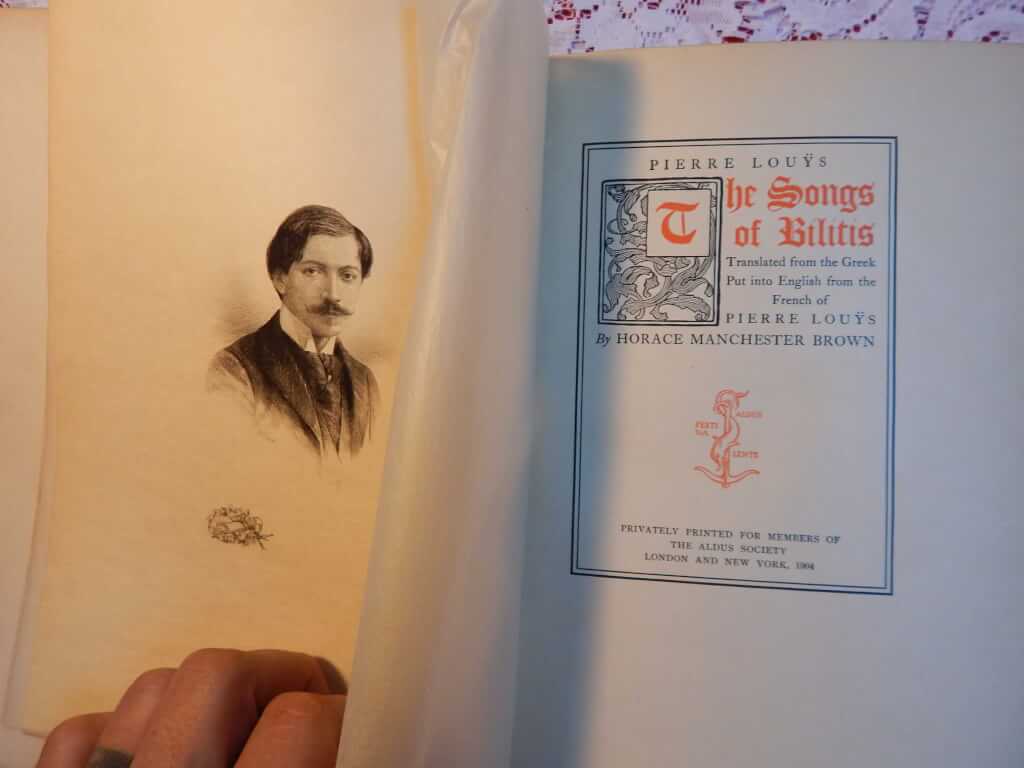 The Songs of Bilitis, Translated from the Greek, Put into English from the French of Pierre Louys by Horace Manchester Brown, illust. James Fagan (Privately Printed for Members of the Aldus Society, London and New York, 1904, #30/971) 7.25"x10.25", 341pp., 3/4 blue leather over blue boards, gilt decorations on boards, gilt titles and gilt and color decorations on spine, marbled boards, top edge gilt, other edges deckled, frontispiece portrait of author and two original etchings by James Fagan, good+ condition for age, some rubbing on spine and bumping to corners. Early (first?) translation of Les Chansons de Bilitis, rare and beautifully bound english translation of this classic in lesbian literature. The Songs of Bilitis (Les Chansons de Bilitis) is a collection of erotic, essentially lesbian, poetry by Pierre Louÿs published in Paris in 1894. Since Louÿs claimed that he had translated the original poetry from Ancient Greek, this work is considered a pseudotranslation. The poems are in the manner of Sappho; the collection's introduction claims they were found on the walls of a tomb in Cyprus, written by a woman of Ancient Greece called Bilitis, a courtesan and contemporary of Sappho to whose life Louÿs dedicated a small section of the book. On publication, the volume deceived even the most expert of scholars. Louÿs claimed the 143 prose poems, excluding 3 epitaphs, were entirely the work of this ancient poet — a place where she poured both her most intimate thoughts and most public actions, from childhood innocence in Pamphylia to the loneliness and chagrin of her later years. Although for the most part The Songs of Bilitis is original work, many of the poems were reworked epigrams from the Palatine Anthology, and Louÿs even borrowed some verses from Sappho herself. The poems are a blend of mellow sensuality and polished style in the manner of the Parnassian school, but underneath run subtle Gallic undertones that Louÿs could never escape. To lend authenticity to the forgery, Louÿs in the index listed some poems as "untranslated"; he even craftily fabricated an entire section of his book called "The Life of Bilitis", crediting a certain fictional archaeologist Herr G. Heim ("Mr. C. Cret" in German) as the discoverer of Bilitis' tomb. And though Louÿs displayed great knowledge of Ancient Greek culture, ranging from children's games in "Tortie Tortue" to application of scents in "Perfumes", the literary fraud was eventually exposed. This did little, however, to taint their literary value in readers' eyes, and Louÿs' open and sympathetic celebration of lesbian sexuality earned him sensation and historic significance.
The Songs of Bilitis, Translated from the Greek, Put into English from the French of Pierre Louys by Horace Manchester Brown, illust. James Fagan (Privately Printed for Members of the Aldus Society, London and New York, 1904, #30/971) 7.25"x10.25", 341pp., 3/4 blue leather over blue boards, gilt decorations on boards, gilt titles and gilt and color decorations on spine, marbled boards, top edge gilt, other edges deckled, frontispiece portrait of author and two original etchings by James Fagan, good+ condition for age, some rubbing on spine and bumping to corners. Early (first?) translation of Les Chansons de Bilitis, rare and beautifully bound english translation of this classic in lesbian literature. The Songs of Bilitis (Les Chansons de Bilitis) is a collection of erotic, essentially lesbian, poetry by Pierre Louÿs published in Paris in 1894. Since Louÿs claimed that he had translated the original poetry from Ancient Greek, this work is considered a pseudotranslation. The poems are in the manner of Sappho; the collection's introduction claims they were found on the walls of a tomb in Cyprus, written by a woman of Ancient Greece called Bilitis, a courtesan and contemporary of Sappho to whose life Louÿs dedicated a small section of the book. On publication, the volume deceived even the most expert of scholars. Louÿs claimed the 143 prose poems, excluding 3 epitaphs, were entirely the work of this ancient poet — a place where she poured both her most intimate thoughts and most public actions, from childhood innocence in Pamphylia to the loneliness and chagrin of her later years. Although for the most part The Songs of Bilitis is original work, many of the poems were reworked epigrams from the Palatine Anthology, and Louÿs even borrowed some verses from Sappho herself. The poems are a blend of mellow sensuality and polished style in the manner of the Parnassian school, but underneath run subtle Gallic undertones that Louÿs could never escape. To lend authenticity to the forgery, Louÿs in the index listed some poems as "untranslated"; he even craftily fabricated an entire section of his book called "The Life of Bilitis", crediting a certain fictional archaeologist Herr G. Heim ("Mr. C. Cret" in German) as the discoverer of Bilitis' tomb. And though Louÿs displayed great knowledge of Ancient Greek culture, ranging from children's games in "Tortie Tortue" to application of scents in "Perfumes", the literary fraud was eventually exposed. This did little, however, to taint their literary value in readers' eyes, and Louÿs' open and sympathetic celebration of lesbian sexuality earned him sensation and historic significance.

